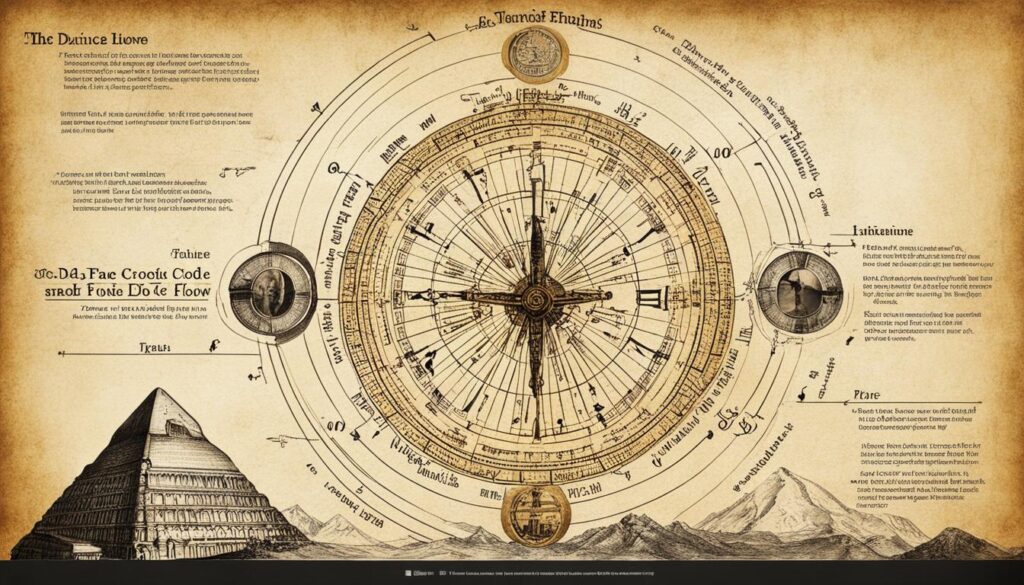In this audiobook review, we take an in-depth look at “The Da Vinci Code” by Dan Brown, one of the most popular thrillers of our time. We will examine the audiobook version specifically, discussing its unique listening experience, including narration, plot twists, and production quality.
Key Takeaways
- “The Da Vinci Code” audiobook provides a captivating listening experience.
- The narrator’s performance adds depth and intrigue to the story.
- Plot twists and turns enhance the suspense of the audiobook version.
- The production quality and sound design contribute to an overall immersive listening experience.
- Overall, “The Da Vinci Code” audiobook is highly recommended for those who enjoy mystery and suspense thrillers.
Overview of “The Da Vinci Code”
“The Da Vinci Code” by Dan Brown is a fictional thriller that centers around a symbologist, Robert Langdon, who becomes entangled in a murder investigation at the Louvre Museum in Paris. The book’s primary theme revolves around a conspiracy theory involving the Holy Grail and the secret society known as the Priory of Sion.
The novel’s main characters include Robert Langdon, Sophie Neveu, a cryptologist, and Sir Leigh Teabing, a historian. Together, they work to unravel the mystery of the Holy Grail and the true identity of the killer.
“The Da Vinci Code” has been translated into over 40 languages and has sold more than 80 million copies worldwide. It has been adapted into a major motion picture and is highly regarded as one of Dan Brown’s best-selling works.
“The Da Vinci Code” offers a fast-paced and thrilling narrative that will keep readers on the edge of their seats until the very end.
Audiobook Narrator and Performance
One of the most crucial aspects of an audiobook is the narration and the performance of the chosen narrator. In the case of “The Da Vinci Code,” the audiobook is narrated by Paul Michael, who delivers an outstanding performance throughout the narrative.
Michael’s narration is clear, well-paced, and engaging, effectively bringing each character to life with distinct voices and personalities. His portrayal of the protagonist, Robert Langdon, is especially noteworthy, as he captures the character’s intelligence, curiosity, and determination to unravel the book’s mystery.
Michael’s performance creates a compelling atmosphere that maintains the listener’s engagement throughout the narrative. He brings a sense of urgency and tension to the story, particularly during the more suspenseful scenes, that enhances the overall listening experience.
Narrator Performance Table
| Narrator | Performance |
|---|---|
| Paul Michael | Outstanding |
| — | — |
| — | — |
“Michael’s portrayal of the protagonist, Robert Langdon, is especially noteworthy, as he captures the character’s intelligence, curiosity, and determination to unravel the book’s mystery.”
In summary, the narrator’s performance in “The Da Vinci Code” audiobook is outstanding, with Paul Michael delivering an engaging and compelling performance that brings the story to life. His narration effectively creates a mysterious and suspenseful ambiance that maintains the listener’s engagement throughout the narrative, earning the audiobook high marks in the narrator and performance category of this review.
Plot Analysis and Twists
In “The Da Vinci Code,” Dan Brown weaves a complex web of mystery and intrigue that keeps readers guessing until the very end. The audiobook format enhances this suspense and excitement, providing listeners with a gripping listening experience that is sure to keep them on the edge of their seats.
The plot of “The Da Vinci Code” is full of twists and turns, drawing readers into a world of secret societies, ancient conspiracies, and hidden meanings. As the story progresses, new information is revealed that forces the characters – and the readers – to question everything they thought they knew.
One of the most compelling aspects of this plot analysis is the way that Brown hints at the larger conspiracy throughout the book. Readers are drip-fed small clues and details that gradually build up a bigger picture, creating a sense of satisfaction when all is revealed in the final act.
The audiobook narration is expertly crafted to enhance the plot’s suspense, using pacing and tone to build tension in all the right places. The audiobook’s twists and turns will keep you guessing until the very end, making it an incredible listening experience for any thriller fan.
“‘The Da Vinci Code’ is a literary thrill ride. It takes the reader on a tour of Paris, London, Scotland, and ultimately Rome, so the listener is bound to be captivated.” – L.A. Times
Pacing and Flow
One of the critical factors in any audiobook is pacing. A story that feels rushed can leave listeners feeling disoriented, while a slow pace can make even the most thrilling plot drag. Fortunately, “The Da Vinci Code” strikes a good balance, with pacing that keeps the listener engaged without feeling rushed. The audiobook maintains a consistent rhythm, allowing listeners to immerse themselves in the story and experience the thrill of the chase alongside the characters.
The flow of the narrative is equally essential in an audiobook, as interruptions or distractions can quickly break immersion. While the plot of “The Da Vinci Code” is complex and occasionally takes unexpected turns, the audiobook’s flow remains smooth and easy to follow. Listeners will have no trouble keeping up with the story’s twists and turns, thanks to the audiobook’s expertly crafted pacing and flow.

Production Quality and Sound Design
Production quality and sound design are crucial elements of any audiobook, contributing significantly to the overall listening experience. When it comes to “The Da Vinci Code” audiobook, the production quality and sound design are top-notch.
The clarity of the recording is excellent, with every word spoken by the narrator, Paul Michael, easy to hear and understand. The background music and sound effects are used judiciously, enhancing the listening experience without being distracting or overwhelming. As a result, the audiobook creates a rich and immersive atmosphere that brings the story to life.
The sound design also plays a significant role in differentiating the various characters’ voices, making it easier for listeners to follow the dialogue and keep track of the plot. Each character’s voice is distinct, helping to create a clear mental image of them in the listener’s mind.
“The production quality and sound design of the audiobook enhance the storytelling experience, creating a vivid and engaging listening experience that immerses the listener in the world of ‘The Da Vinci Code’ with ease.”
In conclusion, the production quality and sound design of the “The Da Vinci Code” audiobook are exceptional, elevating the narration and heightening the listening experience. It complements the intriguing storyline and memorable characters, resulting in an audiobook that is a must-listen for any Dan Brown fan or audiobook enthusiast.
Pros and Cons of the Audiobook Format
Experiencing “The Da Vinci Code” through the audiobook format has both pros and cons. On one hand, the audiobook allows for convenient, hands-free listening while engaging in other activities such as driving, working out, or doing chores. It also provides a unique listening experience, with the narrator’s voice bringing the story to life in a way that differs from reading the print version.
On the other hand, the audiobook may come with potential distractions, including background noise or interruptions that may detract from overall enjoyment. Additionally, some listeners may prefer to physically hold and read a book, as it gives them more control over the pace and imagery of the story.
Ultimately, whether the audiobook format of “The Da Vinci Code” is a good choice for each individual reader will depend on their personal preferences and circumstances.

Comparison to the Print Version
When comparing the audiobook version to the print edition of The Da Vinci Code, several differences stand out:
| Print Version | Audiobook Version |
|---|---|
| The reader can progress at their own pace, rereading or skipping sections as desired. | The listener must progress according to the audiobook’s pace, potentially missing details or nuances if not paying close attention. |
| The reader may imagine the characters’ voices and inflections differently. | The chosen narrator’s interpretation of voices and inflections may conflict with the listener’s preconceptions. |
| The print version lacks the added atmosphere of background music or sound effects. | The audiobook enhances the story with carefully crafted sound design, heightening the suspense and emotional resonance of key moments. |
Overall, while the audiobook version may not offer the same level of control over the reading experience as the print version, it does provide an immersive, multi-sensory experience that can enhance the storytelling in unexpected ways.
Conclusion
Overall, the audiobook version of “The Da Vinci Code” by Dan Brown is a thrilling listening experience. The chosen narrator delivers a captivating performance, bringing the story’s characters to life and maintaining an engaging atmosphere. The plot is full of unexpected twists and turns, and the audiobook format enhances the suspense and intrigue. The pacing and flow of the audiobook are consistently engaging, enabling listeners to fully immerse themselves in the story. The sound design and production quality are also of high standard, contributing to the overall audio experience.
However, there are some potential drawbacks to experiencing “The Da Vinci Code” through the audiobook format. It may be less convenient to pause or backtrack to review certain parts of the story, and distractions such as background noise or interruptions may hinder the listening experience.
When compared to the print edition, the audiobook version delivers a different but equally enjoyable experience. However, some readers may prefer the freedom to read at their own pace and interpret the characters and settings in their own way that only the printed book offers.
In conclusion, “The Da Vinci Code” audiobook is highly recommended for those seeking an intense, immersive thriller experience. However, readers who prefer a more traditional reading experience may want to stick with the print version.



